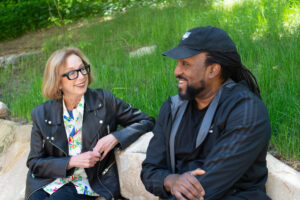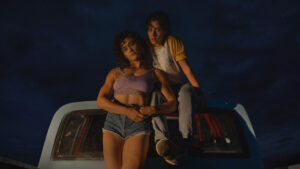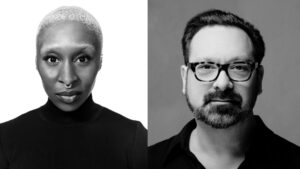Sterlin Harjo
Before 2001, I had almost no idea what Sundance was, other than a prestigious film festival that happened in the mountains of Utah. A professor at the University of Oklahoma suggested I go listen to Bird Runningwater, a graduate of the university who had come back to speak on behalf of Sundance Institute and do a little outreach work in his home state. That was when I first learned about the incredible work Sundance Institute does to develop filmmakers.
After Bird’s speech, I spoke with him on a bench outside. I told him I wanted to make movies. Without missing a beat, he said, “Okay. Let’s do it. Send me a script.” So I went to work. I sent a script in. It didn’t get me into the labs, but the folks at Sundance liked it enough to wait on my next script. I finished a new script and sent it in. To my surprise, I made it past the first round of the interview stage. I then received a message saying that I was going to get a call from Feature Film Program founding director Michelle Satter the next day. I figured it was either another interview or a rejection call.
I was in Seminole, Oklahoma, roofing a house with two biker brothers, who always called me Spencer because they couldn’t remember my name, when I got the call that changed my life. Satter informed me that I was coming to the Sundance Institute Screenwriters Lab. I thanked her, called everyone I knew, and then climbed back onto the roof.
There are a lot of talented people here in middle America who don’t get exposure to good films and filmmakers like they do on the coasts, so it means a lot for Sundance to bring films here to “flyover country.” I know firsthand what it’s like to be a filmmaker in Oklahoma and have someone take a chance on you, so when I heard that the Sundance Film Forward Program was coming to Oklahoma, I was honored that they asked me to be involved. It was also exciting that Sundance teamed up with the Chickasaw Nation to bring the films here and show them at the stunningly beautiful Chickasaw Nation Cultural Center in Sulphur, Oklahoma.
On the first day, Sundance screened my short film Goodnight Irene along with a number of other short films. After the screening I spoke alongside other filmmakers on a Q&A panel. It felt like being in a confessional booth spilling my guts. It’s been three years since my last film, Barking Water, premiered at the Sundance Film Festival, and since then I’ve had a lot of time to reflect on my experiences as a filmmaker and on the film industry in general.
Sometimes panels can be awkward or boring, but at least, on my end, it was a great dialogue with the audience. The Film Forward event brought together a lot of people who were eager to discuss film and listen to the experiences of the different filmmakers on the panels. I was able to open up about my experiences making films and my hopes for the future of Native Cinema.
The Film Forward event was inspiring for me. I can only imagine how much more inspiring it would be for a young student in the audience watching the films and having the filmmakers there to answer their questions. It’s always a beautiful thing to meet filmmakers like Asif Kapadia (Senna) and actress Ningali Lawford (Bran Nue Dae), and to be reminded that there are wonderfully talented people across the world from you making films and telling stories that inspire them.
Those two films have stuck with me in the days since the event. Film Forward helped validate for me what I do with film here in Oklahoma and outside of the Hollywood system. I walked away from the experience with new friends and a refueled tank.




